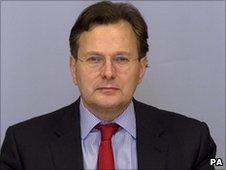Iraq inquiry publishes legal advice to Blair on war
- Published

Campaigners have urged Lord Goldsmith's advice to be released
The Iraq inquiry has released details of the legal advice given to Tony Blair prior to the invasion of Iraq after the documents were de-classified.
Copies of the draft legal advice given by former attorney general Lord Goldsmith was previously kept secret despite calls for it to be published.
The Cabinet Office said it had decided to de-classify now because of the "very exceptional" nature of the inquiry.
There has been long running controversy over whether the war was lawful.
In his evidence to the inquiry in January, Lord Goldsmith acknowledged he had changed his mind on whether a second UN resolution was needed ahead of military action in March 2003.
He had thought one was needed but had ultimately concluded, shortly before the war began, that military action was authorised by existing UN agreements dating back to 1991.
He denied that this came as a result of political pressure from No 10 or anyone else.
The government published the details of Lord Goldsmith's final legal advice to the Cabinet - issued on 7 March - in 2005.
However, campaigners have long called for the release of details of the attorney general's initial legal advice to the prime minister, provided on February 12, 2003.
In this published correspondence, he told Mr Blair that should military action be taken without further approval by the UN Security Council, he expected "the government to be accused of acting unlawfully".
However, he said that following a visit to Washington in early 2003, he was "prepared to accept that a reasonable case" could be made that military action was authorised by existing resolutions, including resolution 1441 in November 2002.
He cited the fact British forces had undertaken military action in Iraq in 1998, and Kosovo in 1999, and in both cases his predecessors as attorney general had given the go ahead on the basis that doing so was "no more than reasonably arguable".
But the documents also give further insight into Lord Goldsmith change of mind on the issue.
In a letter to the prime minister on 30 January, 2003, Lord Goldsmith said he "remained of the view that the correct legal interpretation of resolution 1441 is that it does not authorise the use of military force without a further determination by the Security Council".
Several government lawyers have told the Iraq inquiry that they believed the invasion was unlawful without explicit UN authorisation.
Elizabeth Wilmshurst, a senior Foreign Office lawyer who resigned in protest at the war, told the inquiry earlier this year that she believed the way the government considered the legal arguments for war was "lamentable".
'Explanation'
In a letter explaining his decision to de-classify the documents, head of the civil service Sir Gus O'Donnell said it was a "long-standing convention" that legal advice to ministers was not published so as not to compromise their ability to provide "full, frank and candid advice".
But he said arguments over the legality of the war in Iraq had a "unique status".
"The government's actions with respect to the decision to use military force in Iraq, have in party, contributed to a widely-held view that the public and Parliament are entitled to some explanation for the legal basis for the decision," he said.
He added: "The Iraq inquiry was established with the purpose of learning lessons from how decisions were made and which actions were taken in the run-up to conflict, during the conflict and its aftermath.
"The question of the legal base for military action and how the advice that led to the government's view on this developed is consequently a central part of the inquiry's work....
"I have considered the matter carefully and believe that, given the very exceptional nature, of the Iraq inquiry, this particular material can be declassified without prejudice... to the convention in relation to the law officers' advice."
The Iraq inquiry panel had copies of the declassified documents before Lord Goldsmith appeared before them.
The BBC's World Affairs Correspondent Peter Biles said the documents "put on record" how Lord Goldsmith came to his final decision on the legality of the war but did not appear to shed new light on why he reached the decision.
Our correspondent said the former attorney general had already made it clear that his view on the issue had "evolved" and that he decided a further UN resolution, while desirable, was not necessary.
In January, inquiry chairman Sir John Chilcot expressed frustration that certain officials documents relating to the legality of the war could not be published.